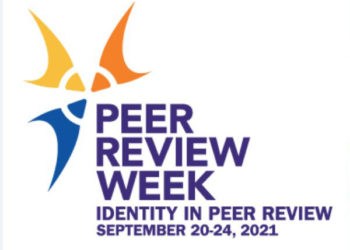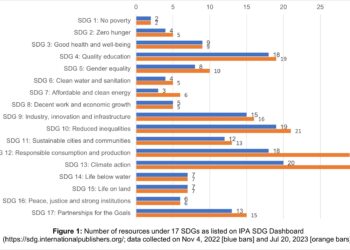Editor’s Note: Today’s post is by Laura Feetham. Laura is Reviewer Engagement Manager at IOP Publishing.
Ghost-writing peer review reports is fundamentally flawed and detrimental to the principles of academic integrity and intellectual honesty. It obscures reviewers’ true contributions and potentially misrepresents the expertise of the individuals involved. Depriving reviewers credit for their reviews perpetuates a culture in which deserving individuals are denied recognition for their hard work. To uphold the principles of integrity, transparency, and intellectual ownership, it is crucial to discourage the practice of ghost-writing peer reviews and to offer alternatives that serve all members of the scientific community.

Credit where credit is due
Early career researchers often support more experienced academics by contributing ideas or comments to their peer review reports. Yet, according to a survey, “70% of co-reviewers report the experience of making significant contributions to a peer review report without knowingly receiving credit”. I know from interviews with some of the researchers who review for us that the lack of recognition for their reviews is a source of frustration.
Legitimizing co-reviewing
But change is here. Some publishers are starting to formally support co-review, including here at IOP Publishing. This method of reviewing research gives peer reviewers the option to officially invite a colleague to collaborate with them. When receiving an invitation to review a manuscript, researchers will now be offered the chance to “co-review with a colleague” and their chosen colleague will receive a formal invitation to join the review. Both reviewers will then be able to receive formal recognition for their work through the Web of Science Reviewer Recognition Service. Furthermore, both reviewers will be eligible for IOP Trusted Reviewer Status if they submit an outstanding report.
The ability to write rigorous and constructive review reports is an art as well as a science, and most peer review skills are pertinent to all academic disciplines. IOP Trusted Reviewer status is designed to support best practice and celebrate outstanding reviews in the physical sciences. Only the top 15% of our reviewers will achieve this recognition and receive certification. We’re currently the only publisher recognizing reviewers based on the quality and timeliness of their reviews through such a dedicated program.
Learning on the job
The great thing about legitimizing reviewer contributions through co-review is that early career researchersgain hands-on peer review experience and receive credit for their contributions. At the same time, experienced reviewers can support the next generation of scientists by mentoring these aspiring researchers while sharing their reviewing responsibilities. This collaborative approach not only benefits the individual reviewers but also promotes a sense of community.
Alleviating peer review pressure
With peer review pressure on experienced researchers mounting due to the growing volume of manuscripts, co-review can also help to address the shortage of reviewers in the scientific community. Giving early career researchers recognition for their work and encouraging collaboration with experienced reviewers makes it easier for early career researchers to become involved in the peer review process. Bringing together a broader range of perspectives from researchers at various stages of their careers will ultimately strengthen the quality and integrity of peer review, leading to more robust scientific publications.
Supporting future peer reviewers
Peer review underpins all technological and scientific development and will play a crucial role in tackling the complex challenges the world faces today. Peer reviewers are the ultimate specialists in a particular field and are best placed to scrutinize, assess, and validate the quality and originality of research. They play a crucial role in optimizing manuscripts and protect the scholarly record from errors before publication. Because of this, I believe that anyone who dedicates their time to peer reviewing the work of others should be supported in doing so. Offering a co-review option is just one step that publishers can take to support reviewers. Peer Review Excellence training and certification is another way that we are supporting the next generation of reviewers.
As recognition in peer review is yet to be applied across the sector, I would like to see ghost-written peer review reports become a thing of the past. Giving every reviewer credit for their contributions to a review report enhances transparency and gives credit where credit is due. Introducing co-reviewing fosters collaboration, alleviates reviewer pressure, and supports a more inclusive future of peer review. By implementing co-review and opportunities to give feedback to reviewers, publishers can strengthen the peer review process and contribute to the advancement of scientific knowledge and innovation.
Discussion
4 Thoughts on "Guest Post — Ghost-writing Peer Reviews Should Be a Thing of the Past"
I agree with Laura’s recommendations.
I have been interviewing early career researchers in the UK for six years and we know (Ciber-research,com/harbingers-2) that ECRs are often asked to help though more often in responding to comments passed on from reviews than in collaborating in the reviews themselves. These ECRs do not feel exploited by their seniors now though my memory is that they did in the past. But yes they do want the recognition as suggested and ideally some of them want to be paid for their labours
As a matter of fact, the American Physical Society has been allowing, and (weakly) encouraging this for more than 20 years. I myself started to review as a junior co-reviewer in 2001…
The claim “change is here” is therefore somewhat too broadly stated, given historically used practices elsewhere. Change is there certainly at the IOP – and I applaud it – it was already there for decades elsewhere.
Overall it’s a good thing that this becomes more widely known among senior referees.
She literally says “But change is here. Some publishers are starting to formally support co-review, including here at IOP Publishing.” I don’t think she’s claiming they’re the first! Chill.
Hi – thanks for taking the time to read the piece. Allowing co-review – which I agree publishers have been doing for some time – and officially recognising the contributions of co-reviewers are not the same thing. That’s the change we’re talking about here – giving people equal recognition and reward for their work. With our co-review policy the editor is fully aware of exactly who has had access to the manuscript and both reviewers can receive certification and recognition via Web of Science RRS.



